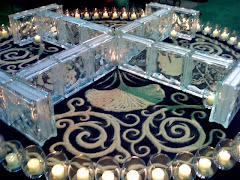I have been working through some of my bread-making skills to help some friends pull together a Lenten series based on the stages that bread goes through as its being made. I pulled out again a copy of Peter Reinhart's Bread Upon the Waters. Peter Reinhart is a lay member of an Eastern Orthodox monastic order, but he's also one of the pre-eminent breadmakers and teachers in this country. Rereading through that little book reminded me again of how much of my own spiritual journey gets mirrored in the things I love to do.
This week, given the ways in which I have functioned and failed to function, the chapter on degassing (also called the "punch down") spoke strongly to me. In it, Reinhart speaks of running Brother Juniper's Cafe with his wife:
(page 65) "Despite [the support structures set up to help us be channels of grace as we ran our cafe], we had many moments of crisis and disagreement surrounding management issues, cooking choices, short-temperedness, and other manifestations of fatigue and stress. We often felt like play actors, putting on happy, cheerful, courteous faces for customers when inside we were grappling with upset and anger. There were times when we were actually afraid to pray to be used by God because it seemed as if we were setting ourselves up to realize our many inadequacies. We often wondered if we were failures...Despite the many difficult days and challenges to our personal sense of virtue and civility, we forged ahead knowing that our obligation to our customers was to model the courtesies that we espoused."
That line about not even being sure that we wanted to pray rang true with me. Sometimes I don't want to pray because I'm not sure I want to hear the answer...don't want to deal with inadequacy. I'm supposed to have competency, but I'm running out of steam for it as well. Sounds a lot like I need to let go. But what does it look like to be "punched down" for the sake of the Kingdom?
(Reinhart, pg. 68) "When we punch down bread dough, humbling it as a creation dependent upon the baker's beneficence and skill, it springs back, stengthened in flavor and character, building upon the fermentation already present. Letting some air out of the dough is a necessary passage if the dough is to become truly great bread. ...
There can be no growth, no evoking of the fullness of our own (or our bread's) potential, without enduring punch downs. They lead to humility. But humility is a powerful creative force; it is a manifestation of one of the energies of God, and what could be more empowering than that?"
Humility. Not a virtue I've ever sought after. Perhaps it's time. Perhaps it's time for all of us.
Gates, Walls, Division, and Love
6 years ago


No comments:
Post a Comment